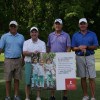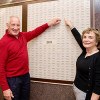St. Jude Stories: How This Local Philadelphia Church Saves Minority Communities Worldwide

Photo Credit: Getty Images
Enon Tabernacle Church is one of the largest congregations in Philadelphia, and the source of millions of dollars provided to local and international charities. With a particular focus on education, health and the empowerment of African diaspora and minority communities, some of the causes they support include St. Jude Children’s Research Hospital, United Negro College Fund and the Community College of Philadelphia. Here, the church leaders of Enon Tabernacle, senior pastor Reverend Alyn E. Waller and his wife, Ellyn Jo Waller, discuss how they inspire a community of thousands to give back to Philadelphia and disenfranchised groups across the globe.
Why does Enon place an emphasis on giving back both locally and globally?
AW: We focus on where the need is. We like to use the term glocal—global and local. We are interested in impacting the diaspora. Whether it is an orphanage in Kenya, a drug rehab in South Africa, or work in North Philly, or St. Jude in Memphis, or the United Negro College Fund, where there is a need we respond. That is what it means to be a church. A church is a place where people come to worship, to learn the word of God, but a church is also a place where people go to get involved and serve humanity.
How do you inspire people to get involved?
AW: The Bible says that it’s the goodness of God that leads us to repentance. We just try to lead people to service. It’s not a guilt-driven approach. A thankful heart is a giving heart. An appreciative person is a giving person. So we try to cultivate an attitude of gratitude in our Church, which leads people to become more mission-minded and caring for others.
We try to make it normative. It is normal to give. It is normal to be a blessing to someone else. As we try to model that and make it normal, then the Church falls in line, and you will then attract those types of people that want to give. Giving people will look for a giving church to belong to.
Why did you choose to get involved with St. Jude?
EW: What was most captivating to me was learning about the work St. Jude does with treatment for sickle cell disease. My mom has a form of the disease. I have many family members with the disease or with the trait. I myself have the trait. The fact that families never receive a bill from St. Jude for treatment, travel, housing or food, meant a lot to me, knowing the burden that removes from families who are struggling with this disease.
I was already a regular personal giver to St. Jude, and then I was able to take a tour of St. Jude Children’s Research Hospital in Memphis, Tennessee. It was there I learned about the wonderful work of Danny Thomas around integrating the hotels in Memphis, and his push for racial and ethnic inclusion at hospitals. Back in 1962, when Danny Thomas was starting St. Jude, he was already treating multicultural patients. They did not have residences at the hospital, so there were families coming in from all over the country. Thomas was told African-American families could not stay in the hotels where the white families were staying, so he told them, “If my African-American families cannot stay here, then none of my families will stay here.” That showed me that St. Jude, from its inception, had not just been working for majority-culture children, but addressing issues of African-American children as well. And because they are their own research lab and they conduct more clinical trials for childhood cancer than anyone else, they’re also working towards a better future. They are creating medications, they are doing cutting edge research and utilizing what they’re learning to affect the lives of children from all over the world.
Are there other charitable efforts Enon is proud of?
EW: Members of Enon Tabernacle support more than twenty children at an orphanage in Kenya, and they’re doing that out of their own pockets. One of the things we do at Enon is, we celebrate and support education. Our work at the orphanage includes providing the tuition, school fees, transportation, uniforms and books for the children there.
We have a pastor’s honor roll at the church, and children who receive all As and Bs get recognition. The high school with the most students on the honor roll gets a donation from Enon Tabernacle, and the donation is in the name of the students. It’s a neat incentive for the kids to get recognition for their hard work while doing something for their school. We also gave $100,000 to the Community College of Philadelphia for their 50th Anniversary Promise Scholarship.
AW: Education is the key for the future. America holds no place for uneducated African-Americans in the 21st century, so we’re doing whatever we can for this next generation to live fully productive lives, and education is the key.
Can you explain the concept of “casting vision,” which you apply at Enon Tabernacle?
AW: Casting vision means we keep before people the needs of humanity and create before people opportunities to meet that need. To cast vision around St. Jude, for example, meant learning about the good work St. Jude does, in programs like their Sickle Cell Disease Treatment Program, and in achieving some of the best survival rates in the world for the most aggressive forms of childhood cancer. When good people are exposed to a need, they’ll respond to it. Casting vision is simply helping people see the need.
If you’d like to see what you can do for the children at St. Jude Children’s Research Hospital locally here in Philadelphia, contact Caitlin Wagner, Senior Regional Development Director for the Philadelphia Market, at caitlin.wagner@stjude.org or visit stjude.org/give.
This is a paid partnership between St. Jude Children’s Research Hospital and Philadelphia Magazine

